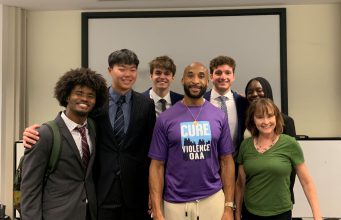Most coffee consumers don’t see past the barista and espresso machine as they partake in their daily ritual of buying a cup of coffee from their local coffee shop.
They may be unaware of where their coffee comes from, the wages people earned to grow and process the beans, or the practices that were used to cultivate the coffee plants that house those beans. They may not know that the market processes that bring them their morning brews may be unethical, exploitative, or environmentally harmful.
Peter Roberts, professor of Organization & Management and the academic director of Specialty Coffee Programs for Goizueta’s Business & Society Institute, is working to educate students on every aspect of the coffee industry so they can be more mindful about how they participate in coffee commerce.
Over spring break this March, Roberts traveled with a cohort of undergraduate BBA, graduate One-Year and Two-Year MBA students, and a Goizueta alumna to learn about specialty coffee growing communities in Guatemala. This marked the trip’s rebirth after a three-year hiatus.


According to De La Gente, the farmer-facing organization Roberts partnered with to host the group, there are approximately 125,000 coffee farmers in Guatemala, 97 percent of which are small-scale producers that make up almost 45 percent of the country’s total coffee production. The organization shares Roberts’ goal to cultivate a more inclusive and equitable coffee industry.
“If I’m dropping $4 on a cup of coffee or maybe $7 on pour over coffee, how can we get coffee producers paid more than, like, $3 for a pound of green beans?” Roberts asks.
We want these producers to not only grow better coffee from a quality perspective, but also to grow it in a climate-smart way and pay their workers living wages.
“However, there is a movement to reward producers for growing high quality, shade-grown coffee following regenerative practices,” Roberts says.
He notes how this movement recognizes that the right kinds of coffee farms, situated around the world, can become carbon sinks rather than carbon emitters.
The group traveled with Roberts’ industry colleague Chad Trewick, who helped educate the group on the climate implications of coffee production. Conventional coffee has high carbon emissions, caused mainly by deforestation and the use of chemicals.
Participants on the trip were walked through the value chain of coffee production.
The group spent six days in and around the “culturally vibrant” city of Antigua, where they toured coffee farms, spoke to farmers about their challenges, heard from a panel of local coffee professionals, and walked through the processes of planting, harvesting, processing, and exporting coffee in ways that are good for both people and the planet.


They experienced Antigua’s exploding third wave coffee scene where coffee growers are emphasizing high quality.
“A number of decades ago, people who grew coffee had never even tried their own coffees because they were locked in an exploitative culture of exporting coffee and not consuming it,” Roberts said.
Now, more Guatemalans are participating and actually drinking excellent coffees. With these developments, two things happen: producers make better money selling coffee internally than they do on global markets, and local consumers provide more and better market feedback.
Roberts notes how it is easy to leave ideas in the back of your mind when you pick them up in a classroom. When students engage with people and processes first-hand, they resonate more.


He says students become more appreciative of coffee and more cognizant of where the coffee they drink comes from.
“Seeing firsthand all the incredibly hard work that goes into coffee production was an eye-opening and humbling experience,” Eike Hoffmann 24MBA said. “While the complexity of improving the livelihoods of farmers and protecting the environment is overwhelming, I came away from the trip feeling empowered as a consumer who can ensure that my morning brew is responsibly sourced.”
In the future, Roberts says he’d like to plan two trips per year. One will focus on coffee and its climate implications. The other will be tied to the Grounds for Empowerment program—an Emory-based initiative that works with women specialty coffee producers to help them tell farm stories that lead to better market relationships and better green coffee prices.
“After all, coffee farmers produce more than just great beans,” Robert says. “They also produce the stories that go behind the coffees we love.”
Want to learn more about the $102 billion global coffee industry and who reaps the financial rewards? Professor Peter Roberts explains it all in “What Goes into Your Cup of Coffee?” on the Goizueta Effect podcast.











